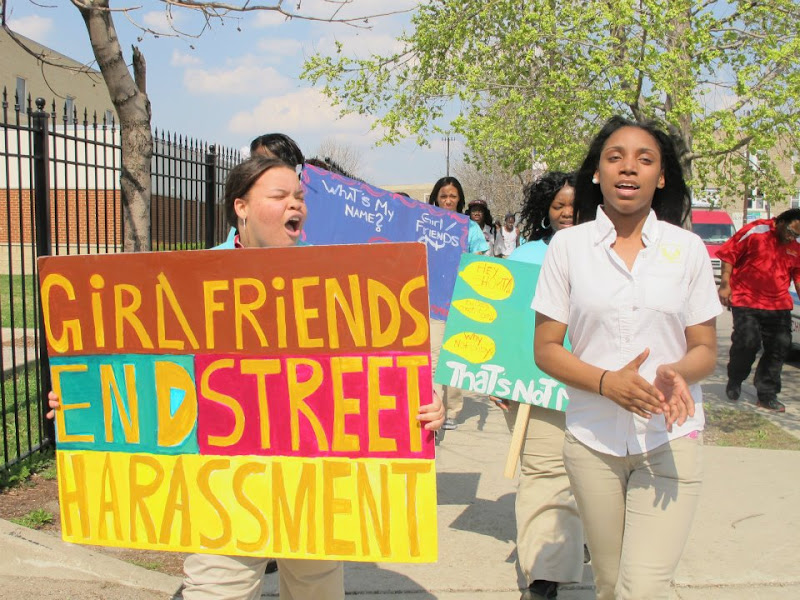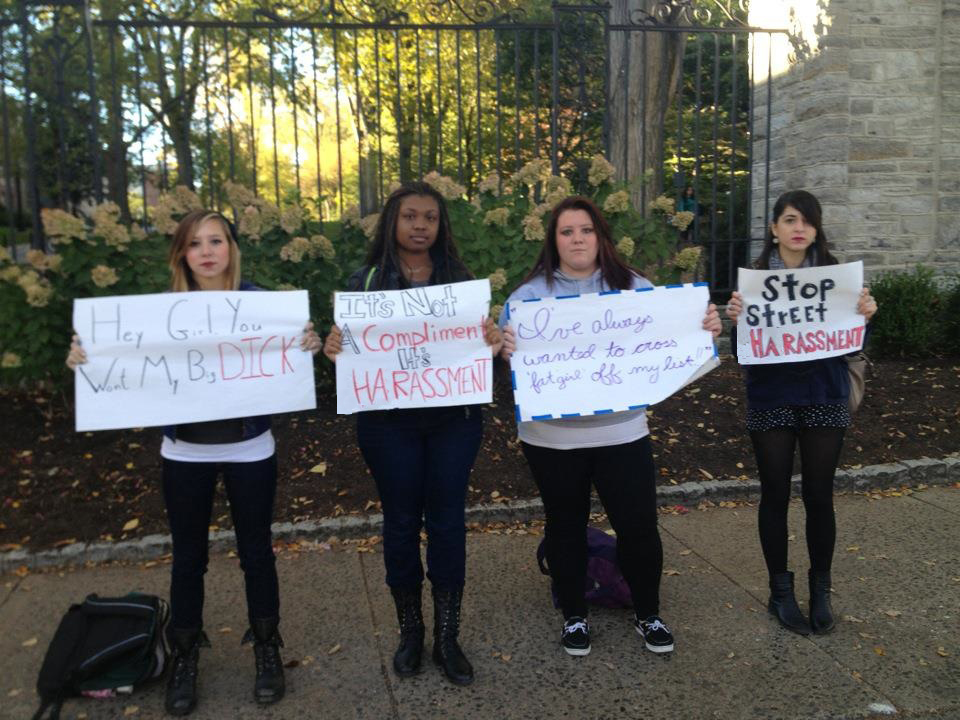At the end of every year, I like to look back, document and reflect on everything that has transpired in the global movement to end street harassment and assault. Yesterday I wrote about 10 of Stop Street Harassment’s achievements. Today, I’m posting a five-part series about the highlights of ALL activism that happened this year (PDF format). WHAT A YEAR!
Post 1: New anti-street harassment campaigns, new initiatives within existing campaigns, and protests.
Post 2 (this one): Creative anti-street harassment initiatives.
Post 3: Government initiatives/collaborations
Post 4: New studies, reports, and significant news articles.
Post 5: Stories from 25 people who stood up to street harassers this year.
1. Afghanistan: Young Women for Change released two short films about street harassment.
2. Afghanistan: Talalo, an Afghan graffiti band, fought street harassment by putting messages on street walls.
3. Azerbaijan: Jake Winn, a Peace Corps volunteer and a youth development facilitator in northern Azerbaijan helped his male students make an Anti-Street Harassment video. The title, “Ay Gardash! Kishi Ol!”, can be translated to, ‘Hey man, be a gentleman!” Peace Corps is working on distributing the video throughout the country, along with a lesson plan and discussion questions for other volunteers to use with their own students. Download the lesson plans: Street Harassment Lesson Plan (English) | Street Harassment Lesson Plan (Azerbaijani)
4a. Belgium: For Meet Us on the Street, Hollaback Brussels held a chalk walk where they visited places they’d been harassed and reclaimed those spots by telling their stories aloud and writing in chalk that they reclaim the area. They’ve held additional chalk walks since then.
4b. Belgium: Over the summer, college student Sofie Peeters’ documentary about street harassment went viral, launching an international discussion about the topic and leading the government of Brussels to pass legislation addressing it. View the full video with English subtitles:
5. Canada: METRAC released a free “Not Your Baby App” to provide responses you can use when experiencing harassment
6. China: After a subway company in Shanghai, China, blamed women for “causing” sexual harassment in June, two young women went to a subway station and wore a “black veil over their face, stepped into a crowded subway station with signs that read, ‘I want my coolness under the sun, but not the pervert in the subway,’ and ‘I can reveal myself, and you cannot bother me.’”
7. Egypt: Anum Khan created the Egyptian version of the video “What Men Say to Men Who Harass Women on the Streets” in Egypt.
8. Egypt: Youth in Egypt created a short movie about street harassment and verbal abuse.
9. Germany: Because soccer/football is so popular in Germany, the group ProChange decided to use the concept of “red cards” as a creative way to speak out against street harassment. In the spring, they distributed 2000 “Red Card” against sexism, “Pink Card” against homophobia, and “Purple Card” Courage. They also distributed special coasters in pubs, bar, from clubs in Dortmund, Germany.
10. India: In early 2012, male ally Dhruv Arora launched the website GotStared.At where people can post photos of the clothes they were wearing when harassed along with their story. What really went viral though were graphics with clever messages against victim-blaming, which, once posted on Facebook, were shared widely. In the fall, GotStared.At won the prestigious UN World Summit Youth Award in the category Power 2 Women!
11. India: Mumbai Boss asks, “What’s the best way to deal with eve-teasers? A full body wax, one tight slap and flour grinding are some of the many punishments suggested in this video survey of Mumbai women.”
12. Israel: In response to ultra-Orthodox Jewish men who called an 8-year-old a whore as she walked to school in Israel, in January, a group of 250 women from Bet Shemesh held a Flashmob dance in the city square, protesting women’s exclusion from the public domain and the harassment of women and girls who do go in public.
13. Istanbul: When Hollaback Istanbul launched the Hollaback! Green Dot Bystander Campaign, they created a companion video with male allies letting harassed persons know they “have their back.”
14. Lebanon: The Adventures of Salwa Campaign released a video about Salwa taking on harassers at a club. She also reports the harasser to the police and then has to stop the police officer who harassed her!
15. Pakistan: In Karachi this spring, students at university SZABIST hosted a “How to respond to harassment” session, a self defense class, and they created a PSA about harassment.
16. Pakistan: Naveen Naqvi created a powerful PSA video about street harassment for gawaahi.org.
17. South Africa: Filmmaker Pascale Neuschäfer created a powerful short film about street harassment in her community last year and in January, she created a new PSA against street harassment. It was filmed during the SlutWalk in Capetown last year.
18. UK: Those Pesky Dames posted this video: “Look at the legs on that” – street harassment needs to stop
19. UK: Isobel Williams created an amazing design project to address street harassment for school. She designed a booklet about the issue that includes a card which women can carry and give to a harassing man as a decoy. The card lists a website and if they visit the site, they can view a short film offering them a chance to gain a reality check on their actions.
20. UK: Hollaback Edinburgh created a humorous, “Said No One Ever” Tumblr. Read an interview with the creator.
21. USA: Bix Gabriel and Joe Samalin are part of the NYC team that created the viral video “Shit Men Say to Men who Say Shit to Women on the Street” for International Anti-Street Harassment Week. In September, the video won the US government’s “Seeing My World through a Safer Lens Video Contest“
23. USA: One woman launched a Tumblr where she records everything men say to her on her way to the train.
24. USA: Aqueelah Grant wrote a practical book about how to deal with crimes on the street, including street harassment called HoodRules. Here’s an interview with her.
25. USA: There’s a new tumblr called Street Harassment Fashion that challenges victim-blaming. Read an interview with the founder.
26. USA: Tatyana Fazlalizadeh is an oil painter/illustrator whose work focuses on portraiture and social/political themes. She’s the artist behind popular anti-street harassment fliers found in Philadelphia, New York City, and Washington, DC. Read an interview with her.
27. USA: Earth Angel created a petition to tell Planet Fitness Gym to deal with harassers at their facility after they ignored her complaints about harassment.
28. USA: Jennifer Phan made a video about street harassment for a sociology class assignment.
29. USA: HappRat is posting her street harassment experiences on a map to show all of the places and times she’s harassed. Read an interview with her.
30. USA: In June, Queerocracy, a New York City-based grassroots organization, presented QRASH Course: Queers Resisting All Street Harassment, an afternoon-long training event for people who witness and experience street harassment in the NYC area.
31. USA: The FX show Totally Biased with W. Kamau Bell covered street harassment!
32. USA: In April, Mary wrote a summer street harassment poem.
33. USA: Collective Action for Safe Spaces & Voices of Men rode the Washington, DC, Metro and collaborated to perform a skit about harassment to bring attention to the issue. They performed it several times on several cars and received positive feedback.
34. USA: You can now view the full anti-street harassment documentary “War Zone” online.
35. USA: During the spring semester, San Jose State University’s Women’s Resource Center did a lot to address gender violence. They created a mural, they put on a production of the Vagina Monologues, created a Tunnel of Oppression (800 people walked through it) and they made several videos about street harassment.
36. USA: Council Member Julissa Ferreras and Hollaback! led an historic community safety audit on Saturday, May 5th in Queens, New York.
37. USA: Denice Frohman, Poet, performs “Dear Straight People” and takes on people who harass lesbians.
38. USA: FAAN Mail and Hollaback Philly created a video where teenage girls “draw from personal experience and testimony to illuminate what gender-based street harassment sounds like.”
39. USA: High school students in Chicago created a 30-second anti-street harassment PSA through Free Spirit Media
40. USA: Hollaback Bmore talked about street harassment with the girls from St. Francis Community Center and helped them relieve their frustration with street harassers with….a water balloon fight!
41. USA: Ines Ixierda in the Queer Women of Color Media Arts Project created a film about street harassment through the stories of Woman of Color and their strategies for self-defense and self-determination.
42. USA: CATCALLED is a collection of women’s stories about street harassment in New York City. For two weeks this August, eleven women in the city kept a log of their harassment experiences, and how the presence (or absence) of catcallers affected their actions.
43. USA: A woman in the USA has recorded more than 50 of her experiences of street harassment over the past few months.
44. USA: SlamPow! Production use humor + anti-street harassment messaging in their creative video “Meat.”
45. USA: Students made this video for their college class HONS201: “Feminism, New Media and Health.”
46. USA: Watch Chescaleigh talk catcalls.
47. Yemen: The Safe Streets campaign released a video about street harassment.
48. I am Not an Object Tumblr’s founder developed a series of 600 “catcalling cards.” They are tiny letterpress cards with a fake number that women who are being followed / aggressively harassed by catcallers can give away so the perp will leave them alone. Once the perpetrator calls the number, he will hear a recording of women telling their harassers exactly what they think of them.











